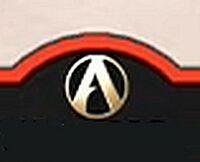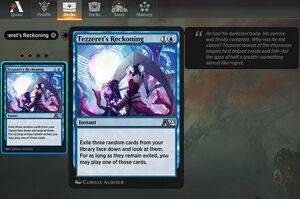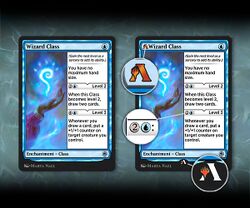Alchemy card
| Alchemy Card | |
|---|---|
| Designed for Alchemy | |
| Scryfall Statistics | |
|
792 cards |
Alchemy cards are digital-only cards featured in the Alchemy play-mode of Magic: The Gathering Arena.[1][2]
Description
There are two kinds of Alchemy cards:
- Rebalanced cards
- Designed-for-digital cards
- Including reimagined cards
Rebalanced Alchemy versions of Standard contain the MTG Arena "A" in-line with the card name. They also have an "A" as a "foil stamp" at the bottom of the card. The foil stamp first was the MTG Arena "A", but was redesigned starting with Alchemy: New Capenna.

Internally, the card name is slightly different as well, with an "A-" prefix to indicate that they are the rebalanced version. For example, A-Esika's Chariot is the rebalanced version of Esika's Chariot. This only really matters for things like deck import and export, though; name-a-card effects and other in-game mechanics still refer to the normal name.
Designed-for-digital Alchemy cards also have the "A" stamp. In addition they have a separate expansion symbol for each released set.
Flavor text

Many Alchemy cards feature flavor text that is not visible on the cards themselves, but rather in a separate pop-up box.
Previous digital-only cards
The 31 cards released in Jumpstart: Historic Horizons that were designed for digital do not have the alchemy "A" stamp on them, were not accompanied by rebalanced cards like other Alchemy releases, and were never part of the Alchemy play format. However, they introduced several digital mechanics that continue to be used in Alchemy cards, and their release could be considered a preliminary version of what would become Alchemy. Alchemy has effectively picked up where the "Historic Horizons" line left off as the outlet for digital-only content, with multiple subsequent Alchemy sets continuing use of those mechanics, and no further "Horizons" or "Jumpstart" products doing so. Therefore, while Historic Horizons cards are not technically Alchemy cards, they are frequently included in that category informally, especially when discussing card mechanics and trends in digital card design.
References
- ↑ Wizards of the Coast (December 2, 2021). "Introducing Alchemy: A New Way To Play MTG Arena". magicthegathering.com. Wizards of the Coast. Archived from the original on 2021-12-02.
- ↑ Wizards of the Coast (December 2, 2021). "MTG Arena: State - Alchemy". magicthegathering.com. Wizards of the Coast. Archived from the original on 2021-12-02.
